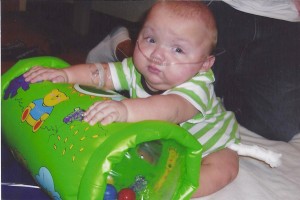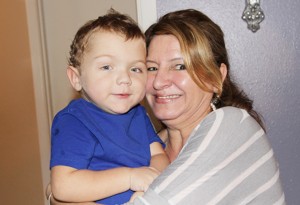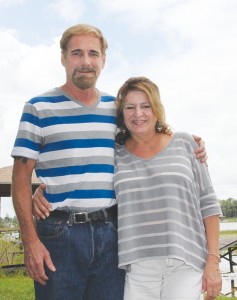Grandparents’ Grand Gesture
For Orlando residents Mercedes and Michael Schultheis, celebrating their grandson’s third birthday this past August didn’t just mean that he’d survived the dreaded “terrible two’s…,” it meant that little William had survived, in the truest sense of the word.
 Diagnosed in utero with Eagle-Barrett Syndrome, commonly referred to as Prune Belly Syndrome (a name coined to describe this abdominal deformity), doctors feared that the condition would be terminal for William. Statistically, about half of these rare cases are fatal. Prune Belly Syndrome often leads to end-stage renal failure, as was the case for William, impacting his kidneys essential ability to remove waste, toxins, and excess fluids. Baby William spent the first seven months of his life in the Hewell Kids Kidney Center at Arnold Palmer Hospital, receiving hours of dialysis, a process needed to clean the blood when one’s kidneys fail. In addition, he required several surgeries to repair other defects, including a heart condition. Each year, the Hewell Kids Kidney Center receives more than 7,000 inpatient and outpatient visits from children just like William, seeking state of the art treatments for various forms of kidney disease.
Diagnosed in utero with Eagle-Barrett Syndrome, commonly referred to as Prune Belly Syndrome (a name coined to describe this abdominal deformity), doctors feared that the condition would be terminal for William. Statistically, about half of these rare cases are fatal. Prune Belly Syndrome often leads to end-stage renal failure, as was the case for William, impacting his kidneys essential ability to remove waste, toxins, and excess fluids. Baby William spent the first seven months of his life in the Hewell Kids Kidney Center at Arnold Palmer Hospital, receiving hours of dialysis, a process needed to clean the blood when one’s kidneys fail. In addition, he required several surgeries to repair other defects, including a heart condition. Each year, the Hewell Kids Kidney Center receives more than 7,000 inpatient and outpatient visits from children just like William, seeking state of the art treatments for various forms of kidney disease.
Though William’s parents, Mike Rennie and Carolina Gutierrez, are involved with his upbringing, Michael explains that “they weren’t fully prepared to take charge of William’s care, especially when facing such severe medical challenges.” So instead of planning for their retirement, Mercedes and Michael assumed custody of their first grandchild and found themselves learning how to become caregivers skilled in using vital in-home dialysis machines and oxygen equipment.
On December 14, 2011, when William’s body was finally strong enough to withstand transplant surgery (at a mere twenty-eight pounds), he received a kidney transplant. “Luckily his mother was a perfect match, which surprisingly doesn’t always happen for children. Carolina donated one of her kidneys to give William life for the second time,” says Michael. According to The National Institute of Diabetes and Digestive and Kidney Diseases (NIDDK), about half of kidney transplants in children come from a living donor, usually a parent or other close family member; whereas in adults, most transplanted kidneys come from deceased donors. Thankfully, William’s body accepted the transplanted organ and, almost immediately, the kidney began to function normally. The Schultheises were soon thrilled to report that his functioning kidney was now creating pee-pee in his diapers!
pounds), he received a kidney transplant. “Luckily his mother was a perfect match, which surprisingly doesn’t always happen for children. Carolina donated one of her kidneys to give William life for the second time,” says Michael. According to The National Institute of Diabetes and Digestive and Kidney Diseases (NIDDK), about half of kidney transplants in children come from a living donor, usually a parent or other close family member; whereas in adults, most transplanted kidneys come from deceased donors. Thankfully, William’s body accepted the transplanted organ and, almost immediately, the kidney began to function normally. The Schultheises were soon thrilled to report that his functioning kidney was now creating pee-pee in his diapers!
“Michael does a great job maintaining our daily schedule,” explains Mercedes, impressed with her husband’s organizational skills. Such tasks include preparation of four liquid meals administered through William’s gastric port, an opening to provide nutrients directly into his stomach, while William watches Mickey Mouse or Little Einstein on TV. The Schultheises say they also rely on a nightshift nurse who monitors an additional slow-infusion feeding and checks William’s vitals. “Prior to the support of William’s nurse, the sleepless nights took a toll on all of us.”
Mercedes, who works in sales, admits that switching her mindset from retirement preparation to baby-proofing her home has been an unexpected transition, but she says that the joy and rewards by far outweigh the sacrifices. “I love getting hugs from this smiling little boy. William has always been a happy baby, even when he was very sick.” Michael credits his wife’s strength and patience to her maternal nature and unconditional love for her family. “Raising a grandchild is different than raising your children, but the knowledge and instincts are still there,” she quips.
 William’s health has improved dramatically; he is down from eight (pre-transplant) medications to four, including immunosuppressants, high blood pressure drugs, and antibiotics. The Schultheises say they are still cautious of his exposure to others since his immune system is still considered compromised, but he enjoys and benefits from the twice-weekly visits from his speech and occupational therapist. “He probably lost close to a year when it comes to achieving traditional milestones. His health and recovery had to be priority number one,” says Mercedes. “The therapist is working on developing his motor skills, along with his oral skills. He needs to learn how to eat solid foods, since he is accustomed to his feeding port.” She adds that she is taking on the task of potty training and eventually hopes to introduce William to Spanish, the language of her native country, Spain.
William’s health has improved dramatically; he is down from eight (pre-transplant) medications to four, including immunosuppressants, high blood pressure drugs, and antibiotics. The Schultheises say they are still cautious of his exposure to others since his immune system is still considered compromised, but he enjoys and benefits from the twice-weekly visits from his speech and occupational therapist. “He probably lost close to a year when it comes to achieving traditional milestones. His health and recovery had to be priority number one,” says Mercedes. “The therapist is working on developing his motor skills, along with his oral skills. He needs to learn how to eat solid foods, since he is accustomed to his feeding port.” She adds that she is taking on the task of potty training and eventually hopes to introduce William to Spanish, the language of her native country, Spain.
“William may not become a star football player, but he’s a happy kid and now he’ll be able to grow up healthy. It wouldn’t have happened without his grandparents,” says Mike, referring to Mercedes and Michael’s commitment to his son. “William’s health and his dialysis treatments were tricky, but they worked past their fears without hesitation for his benefit.”
Now curious and on-the-move like any other three-year old boy, William most enjoys taking family walks outside in their scenic neighborhood, says Michael. “Ironically, the water behind our home – Lake George – is shaped like a kidney!”
A Few Facts about Prune Belly Syndrome:
*Information courtesy of www.prunebelly.org
- A condition characterized by three features: deficient or absent stomach muscles (anterior abdominal wall), urinary tract anomalies (such as a very large bladder), and bilateral cryptorchidism (two undescended testicles)
- Incidence: 1 in every 40,000 births
- 95% of cases diagnosed are boys
- The major prognostic factor is the degree of dilation of the urinary tract; 20% of patients are stillborn, 30% die of renal failure or urosepsis within the first two years of life, and the remaining 50% have varying degrees of urinary pathology
- Other birth defects can also be present, such as heart, gastrointestinal, musculoskeletal, and/or respiratory.








